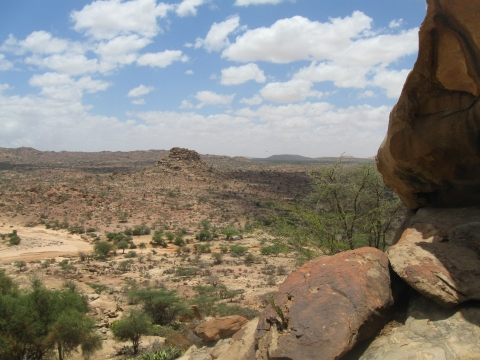
Somalia’s breakaway region of Somaliland signed an agreement with landlocked Ethiopia to give it access to the sea by way of Somaliland’s coastline. The agreement could reshape geopolitics in the Horn of Africa.
The following article was published in the March-April 2024 issue of NewsNotes.
Since proclaiming independence from Somalia in 1991, the federal state of Somaliland has been a beacon of stability in the chaotic Horn of Africa region, printing its own currency, issuing its own passports and running regular democratic elections for its leaders. However, its goal of independence has gone unrecognized internationally, until this January, when landlocked Ethiopia offered to give formal recognition of Somaliland independence in return for access to the port of Berbera on the Gulf of Aden, setting off a firestorm in the Federal Republic of Somalia.
The agreement not only gives Ethiopia access to the port facilities but also use of a leased military base on the Gulf. In return for this access Ethiopia agreed to formally recognize Somaliland independence.
Somaliland’s foreign ministry stated: “This is a significant diplomatic milestone for our country.”
Ironically, this agreement was signed only a few days after Somalia and Somaliland had agreed to resume dialogue about their mutual relations after years of stalemate and the government of Somalia in Mogadishu reacted with fury, stating: “The Ethiopia government’s actions constitute a blatant disregard for international norms and legal frameworks, representing a brazen violation of Somali territorial sovereignty and undermining the progress achieved through ongoing dialogue that was nearing a resolution.”
Ethiopia’s economy has been constrained by lack of access to its own port on the Red Sea but this unilateral agreement with Somaliland has worried its neighbors. Ethiopian Prime Minister Abiy Ahmed repeated his vow that it did not intend to invade any country (meaning Eritrea, with which it has had persistent tensions), but merely that it needed access to a port, explaining: “Ethiopia is a nation whose existence is tied to the Red Sea.”
The Memorandum of Understanding between Ethiopia and Somaliland was signed on January 1, and within a few days the international community reacted unanimously in rejecting Somaliland independence and called for restraint. The British Embassy in Mogadishu stated: “The UK is concerned by escalating tensions in the Horn of Africa. We reaffirm our full respect for the sovereignty and territorial integrity of the Federal Republic of Somalia and we urge restraint and dialogue to peacefully resolve issues.” This position was seconded by the United States, the European Union, the African Union and the Arab League.
Somaliland was previously known as British Somaliland, a protectorate under Great Britain from 1884 up to June 26, 1960, when it was the first Somali territory to gain independence. Four days later, it united with the southern states of Somalia, formerly administered by Italy. Even going back to antiquity it has been a distinct territory, not in opposition to the rest of Somalia as all the people speak the one language of Somali, but at the same time preferring their own autonomy and independence.
There are 5.7 million people in Somaliland, with a per capita income of only $850, kept poor due to its isolation internationally and lack of formal recognition. Not all international actors reject its search for independence; several countries have set up trade offices and other forms of formal presence in Somaliland, and some Members of Parliament in Great Britain have called for recognition of Somaliland independence. Thus, although it will give up some control of its land and facilities to Ethiopia, it has much to gain economically from the agreement and recognition.
The African Union’s Peace and Security Council met on January 17 and called for restraint and meaningful dialogue. It expressed “deep concern over the ongoing tension and its potential adverse impact on peace, stability and security of the region.” On January 18 the eight member states of the Intergovernmental Authority on Development (IGAD) in Eastern Africa called for Ethiopia and Somalia to resolve their differences through dialogue, while again re-affirming support for the territorial integrity of Somalia.
IGAD and the African Union have two goals: to prevent conflict escalating to military conflict; and to prevent any further secessions of territories in Africa in a unilateral attempt to assert full independence. South Sudan did become independent in 2011, but if Somaliland’s independence was recognized internationally there is a fear that this would cascade into other territories in Africa demanding their own independence.
As February comes to a close, the port deal has not yet been implemented, but neither Somalia or Ethiopia are willing to come to a mutual table for dialogue. IGAD and the African Union are continuing to monitor this situation.
Photo of Somaliland landscape by Vladimir Lysenko in 2015 via WikiMedia.
